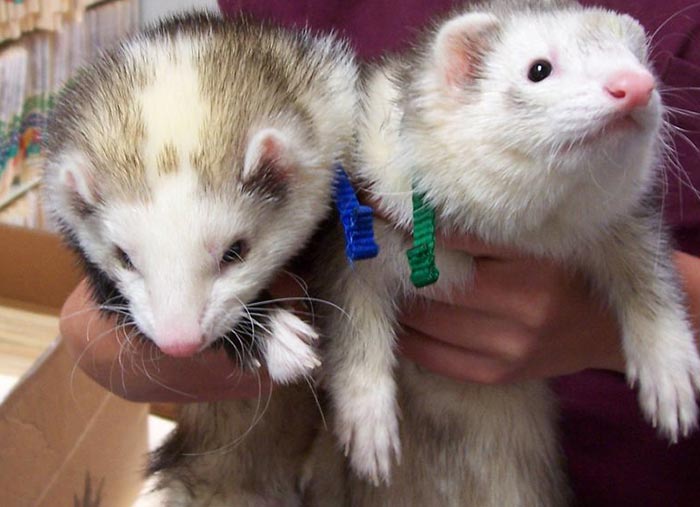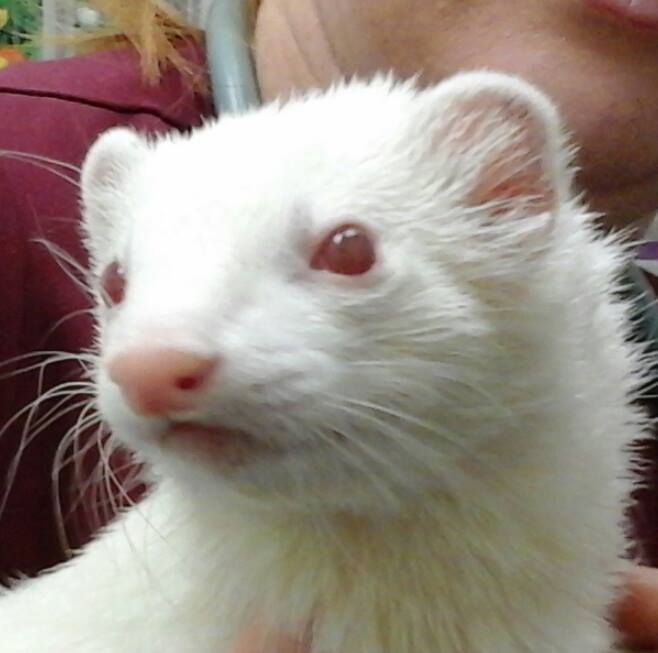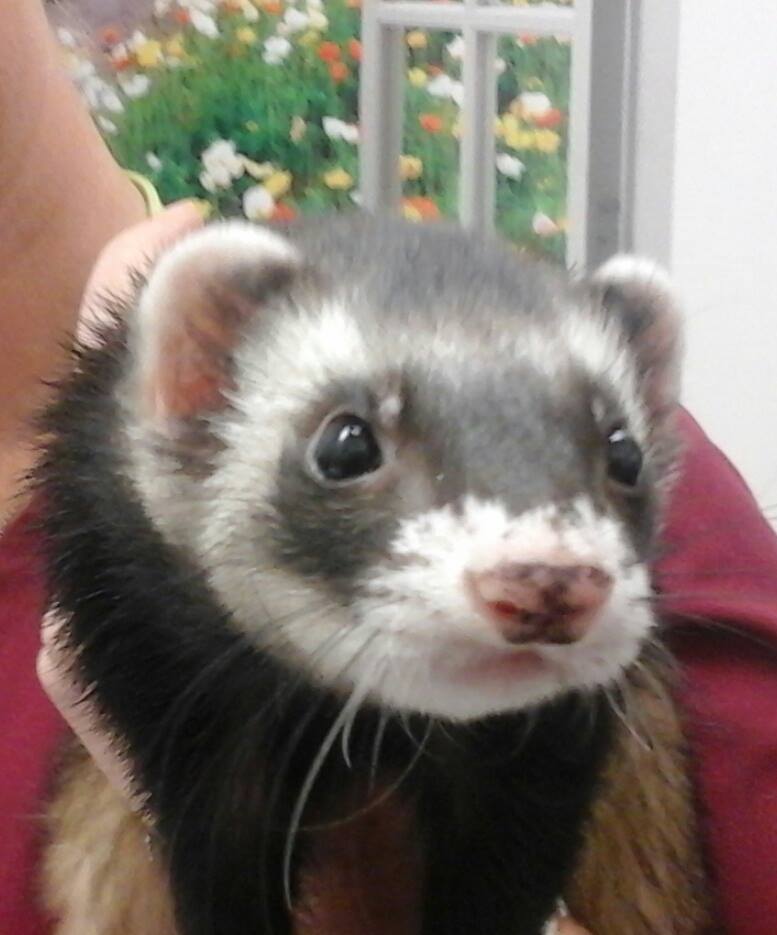|
Ferret Veterinary Care Gilbert AZ
Ferrets are widely cherished as pets across the nation and can be delightful companions. They possess a natural curiosity, boundless energy, playfulness, and are a joy to observe. Ferrets can readily be trained to use a litter box and walk on a harness, making them manageable in terms of indoor space requirements. Their grooming needs are minimal, typically involving gentle brushing and occasional bathing.
However, despite these numerous merits, it took us some time to introduce our dedicated ferret page. Why the delay? Primarily because ferrets tend to experience more health issues compared to all our other pet species combined. While it might be a slight exaggeration, it's essential for prospective ferret owners to recognize that pet ferrets often require veterinary attention not only for preventive care but also to address the various health issues they are predisposed to.
Dr. Patt has been fortunate to share her life with many rescued ferrets and has thoroughly cherished her experiences with them. Her intention is not to discourage anyone from adopting ferrets but rather to encourage prospective pet owners to approach ferret ownership with a solid understanding of ferret diseases and proper care. Additionally, it's crucial to note that some states, notably California, impose restrictions or even bans on ferret ownership. Be sure to research your state's laws before considering adopting a ferret into your family.
A QUICK FACT SHEET
BY: JILL M. PATT, DVM
What Are Ferrets?
Ferrets are domestic animals believed to have originated from European polecats. They are closely related to weasels, skunks, and otters.
Lifespan: Over 6 years
Identification:
Ferrets are usually sold as neutered and descented pets. Males can be identified by their mid-abdominal area where they have a penis.
Housing:
Ferrets should be caged when not under direct supervision. They are curious creatures and may ingest items that require surgical removal. The cage should be spacious, equipped with a hammock bed and a litter pan. Metal mesh cages are commonly used.
Vaccinations:
For Ferrets Under 1 Year:
- They should receive three distemper vaccines 2-3 weeks apart and one rabies vaccine at 3 months of age. Subsequently, a yearly distemper booster and a rabies vaccine every 3 years are recommended.
For Ferrets Over 1 Year:
- They should receive two distemper boosters 3 weeks apart, followed by yearly distemper shots, with rabies vaccination every 3 years.
Assessment for Risk of Exposure:
Before determining the vaccination schedule, it's crucial to assess your ferret's risk of exposure to diseases. Factors such as the ferret's living environment, contact with other animals, and local disease prevalence should be considered when making vaccination decisions.
Allergic Reactions:
Ferrets have a higher risk of severe allergic reactions to vaccines. Therefore, the risk of exposure and need of vaccine is discussed at your pet's exam. If determined necessary, based on exposure, we will administrator one vaccine is administered at a time, with a 15-minute observation period before departure.
Diet:
Feed a commercial diet specifically designed for ferrets. Avoid cat food (low in protein) and dog food (deficient in taurine, which can lead to heart disease).
Water:
Provide fresh, clean water at all times.
Supplements:
If your ferret is on a balanced diet, supplementation is generally unnecessary.
Medical Concerns:
Ferrets have various medical concerns, so maintaining a good relationship with your veterinarian is essential. Common issues include adrenal gland disease, foreign body ingestion, pancreatic tumors, dental problems, GI issues, cardiac disease, and viruses. Ferrets can contract canine distemper from dogs and can transmit and contract Covid and Influenza from humans.
For More Information:
Provided by:
Little Critters Veterinary Hospital
1525 N. Gilbert Rd., Ste. C-101, Gilbert, AZ 85234
Phone: (480) 696-7744
Website: www.littlecrittersvet.com
RECOMMENDED FERRET LINKS:
1. American Ferret Association (AFA):
- Website: ferret.org
- Description: AFA is a leading organization dedicated to promoting the welfare of ferrets. Their website offers a wealth of information on ferret care, health, adoption, and advocacy. You can also find educational materials and connect with other ferret enthusiasts.
2. Ferret Owners Manual Online:
- Website: thechipster.com/fert-man.html
- Description: This online manual provides comprehensive guidance for ferret owners. It covers various aspects of ferret care, including health, diet, housing, and socialization. It's a valuable resource for both new and experienced ferret owners.
3. Holistic Ferret Forum:
- Website: holisticferretforum.com
- Description: This forum is a community of ferret enthusiasts who discuss holistic approaches to ferret care, nutrition, and health. It's an excellent place to connect with like-minded ferret owners and explore alternative care options.
4. The American Veterinary Medical Association (AVMA) - Ferret Care Guide:
5. Ferret Universe:
- Website: ferret-universe.com
- Description: Ferret Universe is a website dedicated to ferret care and education. It offers articles, forums, and resources to help ferret owners better understand and care for their pets.
6. Ferret Central:
- Website: ferretcentral.org
- Description: Ferret Central is a repository of information on ferret health, behavior, and husbandry. It includes articles, FAQs, and links to other ferret-related resources.
These recommended links can serve as valuable references for ferret owners, providing guidance on various aspects of ferret care, health, and well-being. Remember to consult with a veterinarian experienced in ferret care for personalized advice and health-related concerns.
Ferret Diets:
1. Wysong:
- Description: Wysong offers a range of high-quality ferret-specific diets known for their nutritional balance and premium ingredients.
- Website: Wysong Ferret Food
3. Mazuri:
- Description: Mazuri, a trusted name in animal nutrition, provides specialized diets for ferrets, ensuring they receive the essential nutrients for their health.
- Website: Mazuri Ferret Food
8. Oxbow Animal Health:
- Description: Oxbow Animal Health, primarily focused on small animal nutrition, offers a ferret food product formulated to meet the unique dietary needs of these animals.
- Website: Oxbow Ferret Food
These manufacturers are well-regarded for their commitment to providing premium commercial ferret food options. When selecting the right food for your ferret, consider factors such as your ferret's age and consult with your veterinarian for personalized recommendations.
High-Quality Commercial Ferret Food:
- Description: Commercial ferret food is specially formulated to meet the specific dietary needs of ferrets. Look for brands that list meat-based protein sources as the primary ingredients. It provides a balanced and convenient option for your ferret's nutrition.
- Variety of Brands and Flavors:
- Description: Within the category of commercial ferret food, there are various brands and flavors available. It's a good practice to offer your ferret a variety to ensure they receive a well-rounded diet.
- Age-Appropriate Formulas:
- Description: Some brands offer age-specific formulas, such as ferret food designed for kits (young ferrets) or adults. Selecting the right formula based on your ferret's age can help meet their changing nutritional needs.
- Kibble and Pellet Options:
- Description: Commercial ferret food comes in both kibble and pellet forms. Some ferret owners prefer one over the other, and your ferret's preference may also play a role in your choice.
- Avoid Low-Quality Foods:
- Description: Be cautious of low-quality or generic pet foods that may not provide the necessary protein and nutrients for your ferret's health. Stick to reputable brands specifically formulated for ferrets.
- Regularly Check Ingredient Lists:
- Description: Take the time to read the ingredient lists on commercial ferret food labels. Meat-based protein sources (e.g., chicken, turkey, or lamb) should be listed at the top, indicating a high-quality product.
- Consult Your Veterinarian:
- Description: Always seek guidance from a veterinarian experienced in ferret care when selecting the best commercial diet for your ferret. They can offer personalized recommendations based on your ferret's unique needs.
Avoid Feeding Raw Meat:
- Description: It's advisable to avoid feeding raw meat to your ferret due to several significant risks. Raw diets can expose your ferret to potential parasites, such as Toxoplasma and Salmonella, as well as diseases that can be present in raw meat. Ensuring balanced nutrition and preventing these health risks can be complex when feeding raw.
Remember that commercial ferret food is designed to provide a complete and balanced diet for your pet. Regularly feeding a high-quality commercial diet is a convenient and reliable way to ensure your ferret receives the essential nutrients they require for optimal health while avoiding the risks associated with raw diets.
High-Quality Commercial Ferret Food:
- Description: Commercial ferret food is specially formulated to meet the specific dietary needs of ferrets. Look for brands that list meat-based protein sources as the primary ingredients. It provides a balanced and convenient option for your ferret's nutrition.
- Variety of Brands and Flavors:
- Description: Within the category of commercial ferret food, there are various brands and flavors available. It's a good practice to offer your ferret a variety to ensure they receive a well-rounded diet.
- Age-Appropriate Formulas:
- Description: Some brands offer age-specific formulas, such as ferret food designed for kits (young ferrets) or adults. Selecting the right formula based on your ferret's age can help meet their changing nutritional needs.
- Kibble and Pellet Options:
- Description: Commercial ferret food comes in both kibble and pellet forms. Some ferret owners prefer one over the other, and your ferret's preference may also play a role in your choice.
- Avoid Low-Quality Foods:
- Description: Be cautious of low-quality or generic pet foods that may not provide the necessary protein and nutrients for your ferret's health. Stick to reputable brands specifically formulated for ferrets.
- Regularly Check Ingredient Lists:
- Description: Take the time to read the ingredient lists on commercial ferret food labels. Meat-based protein sources (e.g., chicken, turkey, or lamb) should be listed at the top, indicating a high-quality product.
- Consult Your Veterinarian:
- Description: Always seek guidance from a veterinarian experienced in ferret care when selecting the best commercial diet for your ferret. They can offer personalized recommendations based on your ferret's unique needs.
|



|